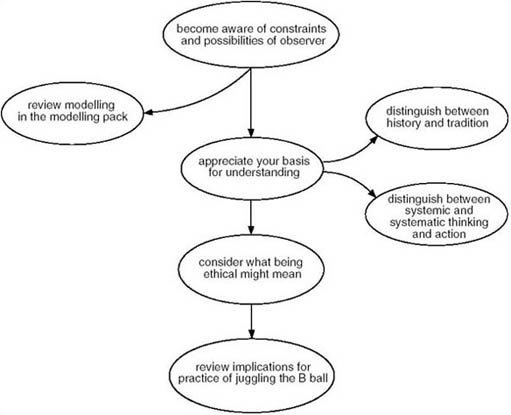13 Part 3: 3 Being a systems practitioner
3.1 The state of ‘Being’
The structure of Section 3 is set out in Figure 25. Use this as a way of keeping track of the argument I am making.

Activity 35
Develop a table in your Learning Journal with three columns. Put the verbs from each of the blobs in Figure 25 in one column. Jot down what they mean to you now in the next column and, at the end of your study of this section, jot down how your understanding has changed, if at all, in the third column.
Answer
You will need Figure 25 in front of you to complete this activity. You will also need to return to the activity once you have finished your study of Section 3 of Part 3. The verbs listed in the table come from the blobs in Figure 25.
| Verb | How I understand these activities now | How my understanding has/has not changed |
|---|---|---|
| Become aware of… | ||
| Review… | ||
| Appreciate … | ||
| Distinguish … | ||
| Distinguish … | ||
| Consider…. | ||
| Review… |
I am concerned with the juggling of the B ball in this section. As I write, I imagine this ball is shiny and thus acts as a mirror reflecting an image of the juggler. The properties of the juggler as systems practitioner come under the spotlight in this section. In choosing the word ‘being’ I am deliberately playing, metaphorically, with different meanings of being – one of which is, of course, ‘human being’. Some of the special features of being human include consciousness, language, emotions, and the capacity to reason or rationalise. It is also claimed that human beings live with a desire for explanations they find satisfying. You may have had the experience of a child repeatedly asking why?, how?, and then stopping after you have given a particular answer. The child finally finds your explanation satisfying – it makes sense within the child's world – and the child no longer needs to ask.
Perhaps you have experienced explanations that did not satisfy at all. If you are aware of this occurring did you note what it felt like? By this I mean, were you in touch with your emotions when you became aware that a particular explanation was satisfying or dissatisfying? By asking this question, I am saying it is legitimate to acknowledge your emotions – they are part of living and need not be ignored. I would go further and argue that an ideal systems practitioner is able to include an awareness of their emotions as well as their rational ideas. I find my Systems practice is enriched when I am able to access both.
